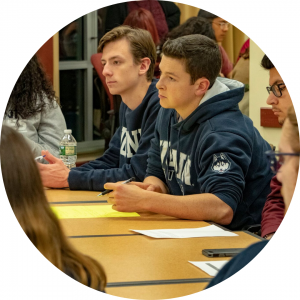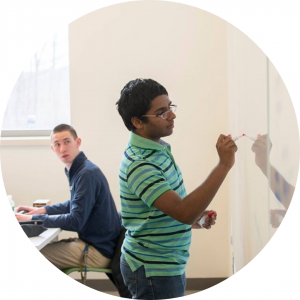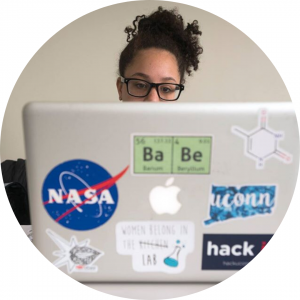Course work is the cornerstone of the Learning Community Program. LC members take their First Year Experience course together, and then experience other course offerings beyond this class. Learning Community courses aid students in developing academic skills, relationships with faculty, staff and peer mentors, and a spirit of inquiry.
Every Learning Community is Faculty-led by a Director who supports the vision for individual Learning Community success. Learn more about individual Learning Community leadership.
 Academic Skills:
Academic Skills:
- Through the small Learning Community seminars, students will develop critical & creative thinking, as well as information, technology, and resource literacy
- By working collaboratively with their peers, who are interested in a similar interdisciplinary topic, students will learn to express themselves effectively through writing and speaking
 Relationships with Faculty, Staff, and Peer Mentors:
Relationships with Faculty, Staff, and Peer Mentors:
- Through exposure to any number of our over 350 Learning Community Team Members, students can build relationships with dedicated UConn connections who will support their passions
- During their first year, students will learn how to develop important positive relationships with members of the UConn community who will continue to support them, academically, professionally, and personally
 Spirit of Inquiry:
Spirit of Inquiry:
- By addressing the most pressing issues of our time, students will explore their academic passions and areas of curiosity
- Students will ignite their interest in innovation through exposure to the Learning Community Innovation Zone
Learning Community Course Suite:
| UNIV | 1810 Learning Community Seminars |
| A component of the First Year Experience (FYE) program, this course is intended to acquaint students with the university and expand their learning experiences in order for them to adjust to the new expectations they will face. Course involves assignments that will provide opportunities for students to enhance their academic and interpersonal skills.
Course Structure: One credit course that will meet once a week. Instruction will consist of lectures, discussions, and interactive workshops. Open to freshman and sophomore students only. Key Course Learning Outcomes: |
|
| UNIV | 1840 Learning Community Service-Learning |
| Activities, discussions, and critical reflections related to service-learning, community engagement, and/or experiential learning activities specific to the theme of a learning community.
Course Structure: Students engage in a required number of service learning activities (varies by community: 20-32 hours per semester) and reflect on their work through assignments and community discussions in this one credit class. Students taking this course will be assigned a final grade of S (satisfactory) or U (unsatisfactory). This course may be repeated for a total of 2 semesters. Key Course Learning Goals: The goals of this course are to engage students in activities outside of the classroom that provide a rich context for what they are learning within their Learning Community as well as across their undergraduate curriculum. Students will examine their personal values and motivations and learn what it means to engage effectively and appropriately as a member of a global community with complex societal problems. Key Course Learning Outcomes: |
|
| UNIV | 3820 Advanced Learning Community Seminar |
| A variable topics course designed to help students engage with the advanced academic and enrichment opportunities unique to their learning community.
Course Structure: The instructional pattern for this one credit course is blended. It may include a series of lectures, discussion sections, discussion boards, collaborative research, and meetings, along with active projects in which the students participate. This course is only with instructors consent and is only open to sophomores, juniors, or seniors in learning communities. With a change in content, this course may be repeated twice for credit. Key Course Learning Objectives: Required Curricular Elements: Individual instructors will determine specific learning outcomes as well as the best content and assessments for their intellectual projects in the contexts of their learning communities. Note: Public Health House takes EPSY 3098 as their Advanced Learning Community Seminar. |
Possible Additional Courses:
| ENGL | 1007 Seminar in Writing and Multimodal Composition |
| Introduction to college composition through multiple technologies. The development of creatively intellectual inquiries through sustained engagement with texts, ideas, and problems. Emphasis on transfer of writing and rhetorical skills to academic and daily life.
Course Structure: Four credit course. Instruction will consist of lectures, discussions, and interactive workshops. Learning Community themed english sections are only open to freshman. Students in Business Connections House, Leadership House, Public Health House and the English Non-Residential Learning Communities may be pre-enrolled in this course. Note: ENGL 1007 is a required course for all UConn students. Students who receive credit for ENGL 1007 through the Early College Experience program or Advanced Placement credit are not required to repeat the course through their Learning Community (LC). Learning Community students can take a non-LC English if space is not available in a LC themed section. |
| HRTS | 1007 Introduction to Human Rights |
| Exploration of central human rights institutions, selected human rights themes and political controversies, and key political challenges of contemporary human rights advocacy.
Course Structure: Three credit course. Instruction will consist of lectures and discussions. First-Year students who are members of the Human Rights & Action House Learning Community will be pre-enrolled in this course. Note: HRTS 1007 fulfills a Content Area 2 or Content Area 4-INT requirement. Students who receive credit for HRTS 1007 through the Early College Experience program or Advanced Placement credit are not required to repeat the course through their Learning Community (LC). |
|
| PHIL 1004 Philosophy and Social Ethics | |
| Topics may include the nature of the good life, the relation between social morality and individual rights, and practical moral dilemmas.
Course Structure: Three credit course. Instruction will consist of lectures and discussions. First-Year students who are members of the Business Connections House Learning Community will be pre-enrolled in this course. Note: PHIL 1104 fulfills a Content Area 1 requirement. Students who receive credit for PHIL 1104 through the Early College Experience program or Advanced Placement credit are not required to repeat the course through their Learning Community (LC). |
|